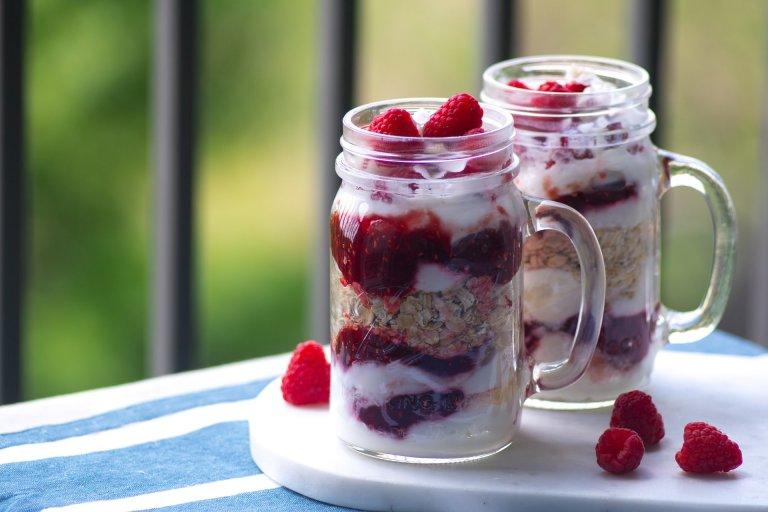We’ve all heard lots of talk about the gut and how it influences many other things in our bodies, including the skin. In the small and large intestines there are trillions of microbes such as bacteria, fungi, yeast and viruses. Before you freak out it is important to know that they have a job to do such as digestion and metabolism as well as maintaining your immune system. Some gut microbes even produce molecules that help make vitamins or hormones that are used by the body.
How do they get in there you may ask? From our food, most things get destroyed by the stomach acid but some things get through and live in the gut. The gut microbiome changes and is affected by diet, medications and illness so keeping it happy keeps our bodies happy too. When there is an imbalance between healthy and unhealthy microbes we get gut dysbiosis. How do you know you have that? You get things like constipation, diarrhea, bloating and issues with acid reflux. It is also thought to be linked to things like diabetes or bowel diseases such as irritable bowel syndrome (IBS).
This sounds scary but it’s not and if it worries you there are easy ways to fix a gut microbiome imbalance. Eat lots of colorful fruits and vegetables the key is variety. Researchers at Ohio State University found that when they fed pigs tomatoes for two weeks it diversified their gut microbes. They will be testing this out in humans too! Another way to improve the gut microbiome is to add fiber. 25g for women and 35g for men, a day will keep the bowels moving, lower cholesterol and even out sugar levels. Keeping processed foods at a low also helps. Adding fermented foods like yogurt, kimchi and helps bring good bacteria into your gut microbiome to lower your intestine’s pH level. Low pH (acidic) kills off bad bacteria leaving good bacteria to do things like produce essential vitamins like B12 and K. Avoid antibiotics if possible because they destroy the bad and good microbes in the gut Taking too many acid reducing products also raise the pH in your stomach giving pathogens you eat a chance to survive and change the microbiome. Probiotic and prebiotic supplements can add missing good bacteria. Prebiotics are found in artichokes and apples and feed healthy bacteria. Probiotics are living bacteria such as Lactobacillus and Bifidobacterium that can help the gut. There are lots of types of probiotics that help different things from IBS to reducing inflammation. There is evidence that eating probiotics can prevent skin issues such as aging, acne, rosacea, yeast and bacterial infections, psoriasis and dermatitis.So bring on that yogurt for beautiful skin and body.
Come in and see us at Invigorate Advanced Aesthetics in Centennial,
Colorado to discuss your diet and supplement needs.


 Alexis Pepple2024-03-09Robyn & her team are truly fantastic. They have come up with a whole skin care routine for me. I love knowing that I have a plan to accomplish the skin care goals that I want. I also love their new membership program. It is such a great value I would highly recommend.
Alexis Pepple2024-03-09Robyn & her team are truly fantastic. They have come up with a whole skin care routine for me. I love knowing that I have a plan to accomplish the skin care goals that I want. I also love their new membership program. It is such a great value I would highly recommend. Alanna Rohloff2024-03-01I’m feeling as motivated as ever to build muscle and lose body fat, working with Caitlin as my nutritionist and coach. She’s so smart and kind. I also love going into the med spa- it’s beautiful and comfortable. Highly recommend this company to anyone.
Alanna Rohloff2024-03-01I’m feeling as motivated as ever to build muscle and lose body fat, working with Caitlin as my nutritionist and coach. She’s so smart and kind. I also love going into the med spa- it’s beautiful and comfortable. Highly recommend this company to anyone. Elexis Zamora2024-02-26Robyn was Great! She answered all of my questions she was professional and listened to what I wanted my results to be. I got Botox and lip filler. I’m currently four days out and I can see results but still waiting on the Botox to kick in! But overall a clean environment cute spa! And so far I love the way my lips turned out. Great experience!!!
Elexis Zamora2024-02-26Robyn was Great! She answered all of my questions she was professional and listened to what I wanted my results to be. I got Botox and lip filler. I’m currently four days out and I can see results but still waiting on the Botox to kick in! But overall a clean environment cute spa! And so far I love the way my lips turned out. Great experience!!! vibes amanda2024-02-24The work I’ve had done here was truly life changing. Aside from the clinic being so inviting and extremely elegant, the staff is so kind and beyond talented. I’ve gotten my lips done here twice now and both times I’ve gained a new found confidence that has made all the difference in the world in my day to day life. This is the greatest investment I’ve ever made into how I feel about myself and I will continue to get all of my aesthetic work done here. I cannot recommend this place enough!
vibes amanda2024-02-24The work I’ve had done here was truly life changing. Aside from the clinic being so inviting and extremely elegant, the staff is so kind and beyond talented. I’ve gotten my lips done here twice now and both times I’ve gained a new found confidence that has made all the difference in the world in my day to day life. This is the greatest investment I’ve ever made into how I feel about myself and I will continue to get all of my aesthetic work done here. I cannot recommend this place enough! Vicious Vanity Ink Tattoo Studio2024-02-23Caitlin is absolutely amazing! She is very helpful and extremely knowledgeable! She is super supportive and is there to help you every step of the way! I highly recommend Caitlin to assist you in all your wellness and nutritional needs!
Vicious Vanity Ink Tattoo Studio2024-02-23Caitlin is absolutely amazing! She is very helpful and extremely knowledgeable! She is super supportive and is there to help you every step of the way! I highly recommend Caitlin to assist you in all your wellness and nutritional needs! Nikki Cox2024-02-23Do it! You'll love how you look after!
Nikki Cox2024-02-23Do it! You'll love how you look after! Ashley Campbell2024-02-22Everyone at Invigorate is so welcoming and kind. I got a facial with Robyn and she was wonderful and my face feel nice and fresh. Excited to continue to go back back for my other skin care needs.
Ashley Campbell2024-02-22Everyone at Invigorate is so welcoming and kind. I got a facial with Robyn and she was wonderful and my face feel nice and fresh. Excited to continue to go back back for my other skin care needs. Kathy Coffey2024-02-22Wonderful experience
Kathy Coffey2024-02-22Wonderful experience Jenny D2024-02-20Amanda is amazing and made me feel so welcome and cared for!Google rating score: 5.0 of 5, based on 111 reviews
Jenny D2024-02-20Amanda is amazing and made me feel so welcome and cared for!Google rating score: 5.0 of 5, based on 111 reviews
Site navigation
Office hours
Appointments outside these hours available upon request
Monday to Friday – 9am – 6pm
Saturday – closed
Sunday – closed